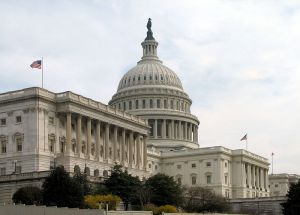As this article is being authored, United States senators are racing against a Thursday, 17 October deadline to raise the federal debt ceiling. If the current debt ceiling of £10.5 trillion (or $16.7 trillion) is not raised within the next twenty-four hours, the United States risks defaulting on its domestic and international loan obligations. The Guardian understandably described the mood of major financial markets as ‘queasy’. An announcement by Fitch, a major credit rating agency, that it would consider downgrading the United States’ current ‘AAA’ credit rating if Washington could not agree to a debt ceiling raise, only added to global concerns. The New York Times reported that although Democrat and Republican senators were collaborating to push through a plan, some hard-line conservatives, known as ‘tea-partiers’, continued to rankle bipartisan efforts.
This recent crisis has awoken many ordinary Americans to the real, global impact of US economic decisions. USA Today cited a Pew Research Center poll suggesting that a slim majority of Americans now favor raising the debt limit before continuing Congressional negotiations. Calls from Western Europe, China and Japan, and the International Monetary Fund (IMF) have been widely publicised in US media outlets.
What is less well understood is the international utilisation of the United States dollar as foreign currency. Currently, a number of Latin American and Caribbean states use the US dollar as their official currency; other countries in the Americas and elsewhere peg their local currency to the US dollar, relying on American monetary decisions to determine their currency valuation and purchasing power. According to the United States Federal Reserve’s own estimates, more than half of all other countries use the US dollar in their official foreign exchange reserves. In sum, decisions taken by the US government concerning American currency, valuation, and debt repayment directly affect the currency situations of dozens of other governments, even before import/export and banking relationships are considered.
National debt defaulting is, unfortunately, an increasingly well-worn path in the global economy. In the most recent issue of The Geographical Journal, Ed Brown, Jonathon Cloke (Loughborough University), Francisco Castañeda (Universidad de Santiago de Chile), and Peter Taylor (Northumbria University) recounted the Latin American financial crisis which plagued Argentina, Uruguay, Chile, and Brazil throughout much of the 2000s. Their research closely examined the world of the ‘unbanked’ – individuals who either cannot or do not engage in ‘traditional’ banking practices (e.g., withdrawing major loans from banks), but instead develop their businesses via micro-finance initiatives. This process is broadly described as ‘bancarización’. Brown et al. contend that geographers still ignore geo-economic studies outside such major financial centres as London, New York, and Tokyo. They add,
Ironically, the (so far) more positive economic experience of Latin American economies during the current global economic crisis may have important lessons for our longer-term understanding of the geography of global financial markets.
Washington, London, and Brussels may indeed have something to learn from Buenos Aires, Santiago, and Montevideo. In part, this is because Latin American governments have (with varying degrees of success) shouldered the responsibility of providing the impoverished with socioeconomic opportunities. Micro-finance initiatives, localised banking infrastructures, and small business development aid has proven remarkably useful in both facilitating entrepreneurship amongst constituencies historically isolated from mainstream business opportunities, and in promoting new money-making endeavours for the middle classes.
![]() ‘US debt ceiling: Senate rushes to draft fiscal plan‘, BBC News, 16 October 2013.
‘US debt ceiling: Senate rushes to draft fiscal plan‘, BBC News, 16 October 2013.
![]() ‘US pushed to brink of default as hopes hang on bipartisan Senate deal – live‘, The Guardian, 16 October 2013.
‘US pushed to brink of default as hopes hang on bipartisan Senate deal – live‘, The Guardian, 16 October 2013.
![]() ‘Senators Press Deal to End Debt Impasse‘, The New York Times, 16 October 2013.
‘Senators Press Deal to End Debt Impasse‘, The New York Times, 16 October 2013.
![]() ‘Shutdown, Day 16: Can nation avert default?‘ USA Today, 16 October 2013.
‘Shutdown, Day 16: Can nation avert default?‘ USA Today, 16 October 2013.
![]() ‘The Federal Reserve in the International Sphere‘, The Implementation of Monetary Policy (Washington, DC: Federal Reserve Publications, 2013), accessed 16 October 2013.
‘The Federal Reserve in the International Sphere‘, The Implementation of Monetary Policy (Washington, DC: Federal Reserve Publications, 2013), accessed 16 October 2013.
![]() Brown B, Castañeda F, Clarke J, and Taylor P 2013, ‘Towards financial geographies of the unbanked: international financial markets, ‘bancarización’ and access to financial services in Latin America‘, The Geographical Journal 179.3, 198-210.
Brown B, Castañeda F, Clarke J, and Taylor P 2013, ‘Towards financial geographies of the unbanked: international financial markets, ‘bancarización’ and access to financial services in Latin America‘, The Geographical Journal 179.3, 198-210.

